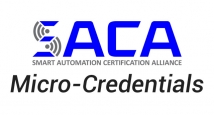Micro-Credentials Lead to Success Between Employers and Learners

Modular certifications help bridge the skills gap by creating quicker pathways to a career
By now you know Industry 4.0, Smart Factories, or Industrial Internet of Things (IIoT), whatever you choose to call it, is booming, but unfortunately well equipped and trained employees in the field are not. There is a skills gap happening in the industry, however, organizations like the Smart Automation Certification Alliance (SACA) are teaming up with industry leaders and community colleges to help create a set of modular certifications. Students will be able to earn stackable micro-credentials that will allow them to begin a lucrative career before fully earning a certificate.
The ”Brief”
It's not only SACA that is helping bridge the gap, but nonprofits like the Education Design Lab (the “Lab”), which co-designs prototypes and tests education-to-workforce models. The Lab recently published a report called, Design Insights Brief: Community College Growth Engine Fund Micro-pathways: A Gateway to Community College Transformation (the “Brief”). The Brief discusses how with the help of educators and employers, it created micro-pathways, which allow students to have the flexibility to build two or more stackable credentials, but still be able to achieve a job in less than a year at or above the local median wage.
SACA community college/systems members at Ivy Tech Community College (Indiana) and Pima Community College (Arizona), as well as Seattle Colleges, the City University of New York, Prince George’s Community College and Austin Community College were the first organizations to test and help create over thirty new pathways. Some of the industries used for the micro-pathway occupations are industrial engineering mechanic, electrician, HVAC technician, cloud associate, electro-mechanical manufacturing technician, cybersecurity professional, and entry-level data analyst.
Meeting the Needs of All
By creating these micro-pathways educators and industry leaders have seen how the micro-credentials and targeted training allow a much more satisfactory outcome to both the student and employer. The top three most important needs learners wanted met are practical pathways with a clear return on investment (ROI), flexible micro-pathways that meet them where they are in their journey, and they want and need deeper and more extensive work-based learning. If students can create a relationship with employers before they even obtain a certificate, then they’ll already have the upper hand on other candidates when it comes to getting hired.
Employers also benefit from the micro-pathways by deepening their relationship with community colleges and creating a pipeline of new talent and sharing ideas on how the industry is constantly evolving. Using these micro-pathways industries can create internships, part-time jobs, and school or volunteer projects allowing students to have more of a work-based learning experience which will be helpful once they obtain their certificate. One of the most important things learned in the research was that employers still embrace critical soft skills such as communication, critical thinking and intercultural fluency.
Which Path to Take
If interested in creating micro-pathways one of the best ways SACA says is to begin creating partnerships with industry leaders in your area and determine what kind of jobs and skills they are looking for. SACA offers micro-credentials in many areas, including electrical, motor control, programmable controllers, mechanical, pneumatics, hydraulics, automation, Industry 4.0 technologies, robotics, electronic sensors, smart factory operations, process control, Ethernet communications, networking, data analytics, and predictive maintenance. If you’re ready to start paving the way with micro-pathways and micro-credentials, contact Tech-Labs at sales@tech-labs.com or call 800-445-1088.




